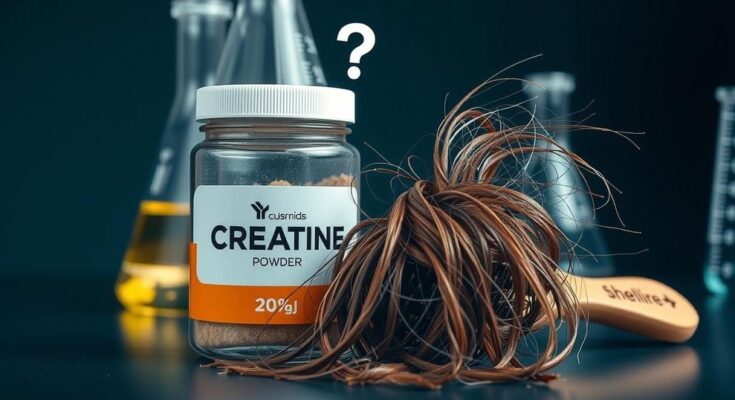Creatine is a natural energy compound essential for muscle performance, often used by athletes for enhanced workouts and increased muscle mass. Despite concerns linking it to hair loss through elevated DHT levels, research largely disputes these claims. Initial side effects reported are mostly exaggerated, emphasizing the importance of proper dosage and health consultations for safe use.
Creatine is a natural compound crucial for energy production in muscles, primarily found in muscle tissue. Many athletes use creatine supplements to enhance performance and increase muscle mass, which studies support. Although its effectiveness in treating conditions like fatigue or depression is debated, it’s widely recognized for its role in exercise enhancement. Concerns about creatine leading to hair loss stem from limited and mostly anecdotal evidence. A notable 2009 study involving rugby players suggested an increase in dihydrotestosterone (DHT) levels with creatine use, a hormone associated with facial hair growth but potential scalp hair loss. However, subsequent studies show mixed results, with most indicating no significant relationship between creatine and hair loss. Creatine helps produce adenosine triphosphate (ATP), essential for muscle activity. While initial research raised concerns about side effects like dehydration and kidney stress, most evidence indicates these claims are overstated. A review found that adverse reactions are more prevalent in studies on men than on women, suggesting that long-term users correctly manage dosages. For safe usage, most experts recommend a daily intake of around 3 grams of creatine, adjusting for body size differences. Though some advocate for a loading phase to quickly increase muscle creatine stores, consistent smaller doses can also be effective. Timing creatine supplementation post-exercise with protein and carbs may yield additional benefits, though more research is needed in this area. For those with pre-existing conditions, other forms of creatine intake through diet, such as meats and fish, might suffice. Alternatives like antioxidants, beet juice, and HMB complement athletic performance without the risks associated with supplements. Consulting healthcare professionals before starting supplementation is vital to tailor the approach to individual health needs.
Creatine has gained fame as a leading supplement among athletes for its ability to boost muscle performance and mass. Understanding its biochemical role and effective use without compromising health is crucial. The article examines claims surrounding creatine’s effects, especially circulating concerns about possible hair loss connected to the hormone DHT and evaluates the varied research responses over the years. The background sets the stage for unraveling the true effects of creatine on athletic performance and overall health.
In summary, while creatine is a valued asset for muscle energy and performance, claims regarding its link to hair loss remain largely unsupported by scientific evidence. The potential side effects appear minimal, especially for individuals without pre-existing health conditions. Evaluating the right intake and consulting with professionals ensures a healthy and effective supplementation journey.
Original Source: www.health.com



